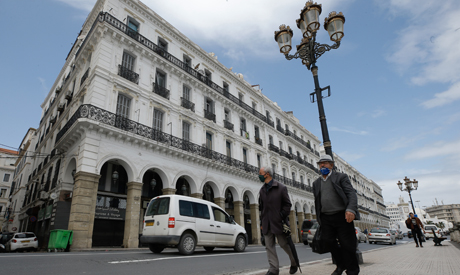
Men wearing face masks walk in the empty streets of Algiers (photo: AP)
Algeria’s pro-democracy movement, which rallied every week for more than a year despite threats, security clampdowns and existential questions, having been stripped of its leverage — massive street protests — due to the COVID-19 pandemic, is now under attack by security services.
News of arrests, speedy trials and prison sentences for activists has become a daily occurrence, shortly after the reform movement, known as the hirak, suspended street action in response to the coronavirus. Algerian authorities banned street gatherings on 17 March and imposed a 7:00pm to7:00am curfew to contain the spread of the virus.
Rights groups say the lockdown emboldened the authorities to intensify its repression of the hirak, knowing that the arrests are unlikely to trigger protests amid the pandemic.
On 24 March and 6 April respectively, courts sentenced leading hirak figures such as Karim Tabbou, head of the opposition political party, the Union Democratique et Sociale (UDS), and Abdelouhab Farasoui, to one year each on vague charges such as “harming national unity”, according to Human Rights Watch.
Tabbou faces a separate trial scheduled 1 June on charges of “harming the national integrity of the territory”, which could carry a prison sentence of up to 10 years, for a speech he made in the city of Kherrata on 9 May. Held in prolonged solitary confinement in Kolea Prison, Tabbou has experienced deteriorating health since suffering a spike in blood pressure and fainting in court.
A presidential pardon 1 April, that freed 5,037 inmates to reduce prison overcrowding during the pandemic, excluded hirak detainees.
Between 7 March and 13 April alone, at least 20 activists were either summoned for interrogation by the police, or arrested and held in pretrial detention, or sentenced on charges stemming from their exercise of their right to freedom of speech or peaceful assembly in six cities in Algeria, according to human rights lawyers.
“At the time when all national and international eyes are focused on the handling of the COVID-19 pandemic, the Algerian authorities are investing time in accelerating prosecutions and trials against activists, journalists and supporters of the hirak movement,” said Heba Morayef, Amnesty International’s Middle East and North Africa director.
“The authorities must immediately and unconditionally release all peaceful activists detained solely for expressing their views online and offline, and/or calling for a democratic change. By arresting and imprisoning activists, the authorities are not only punishing them for their free speech, but also endangering their health given the risks of a COVID-19 outbreak in prison.”
In February 2020, the hirak protest movement marked its first anniversary, reiterating that protesters’ calls for political reform remained unanswered.
According to human rights lawyers, at least 32 people arbitrarily detained during the hirak movement protests remain behind bars; eight of them were arrested since the start of the pandemic, between 25 February and 13 April. All are facing prosecution under the penal code for a range of offences, mainly “harming the integrity of the national territory”, “incitement to unarmed gathering”, or “publications meant at harming the national interest”.
The National Committee for the Liberation of Detainees (CNLD) says that between 26 March and 12 April, authorities summoned at least 12 activists about views they had expressed online, mostly in support of the protest movement.
On 9 April, Sidi M’hamed Court convicted hirak protester and political and human rights activist Ibrahim Daouadji, arrested 16 March, to six months in prison with a 50,000 Algerian dinars (around $450) fine for a video he posted online where he criticised his detention conditions after he was held in pre-trial detention for three months between November 2019 and January 2020.
On 7 March, political activist Samir Benlarbi and national coordinator of the families of the disappeared Slimane Hamitouche were arrested in Algiers during a protest. The Sidi M’hamed Court also prosecuted them for “harming the integrity of the national territory” and “incitement to an unarmed gathering”. Both are now awaiting trial in El-Harrach Prison where they risk a 10-year prison sentence.
Journalists have also faced harassment by the authorities for their interviews, articles or media coverage of the protests.
On 15 April, Minister of Communication Ammar Belhimer admitted that the authorities, without prior notification, blocked two online independent media, Maghreb Emergent and RadioMPost, pending “further legal proceedings” against director Ihsane El-Kadi for “defamation and insult” against President Abdelmadjid Tebboune.
On 27 March, police arrested Khaled Drareni, a prominent journalist, in Algiers. Drareni, correspondent for TV5Monde and Casbah Tribune’s director, is currently held in pre-trial detention in Kolea Prison because of his reporting on the 7 March hirak protest. He faces charges of “incitement to unarmed gathering” and “harming the integrity of the national territory” which could lead to 10-year prison sentence. Drareni has covered the protests since their onset, recording demonstrations and posting footage on his Twitter account.
“It’s an era in Algeria where vague allegations could throw anyone in jail for months, if not years,” Algerian researcher Zine Labidine Ghebouli wrote on Twitter.
“It’s revolting after a year of peaceful protests.”
*A version of this article appears in print in the 7 May, 2020 edition of Al-Ahram Weekly
Short link: